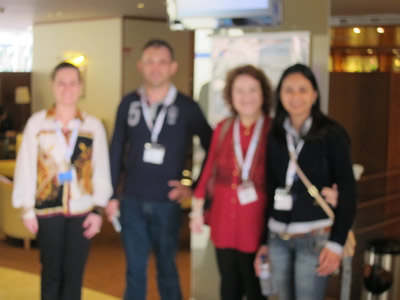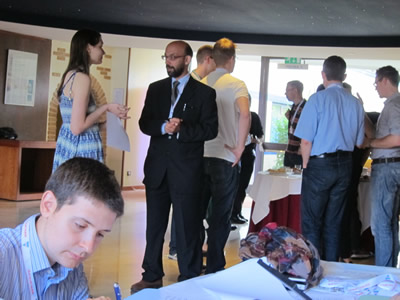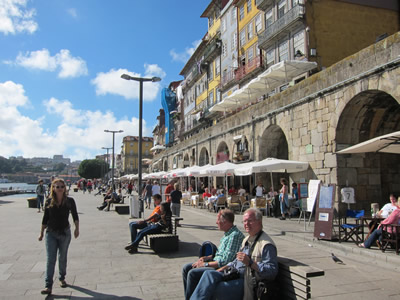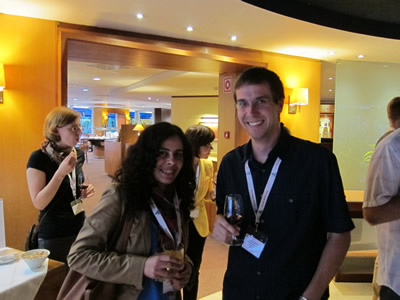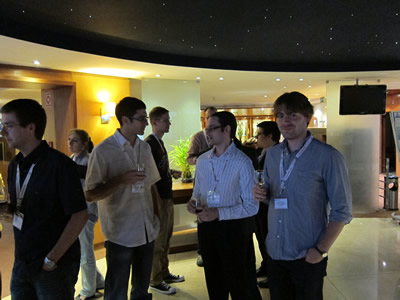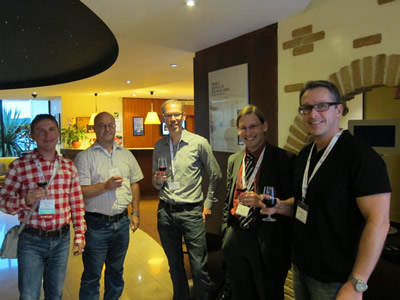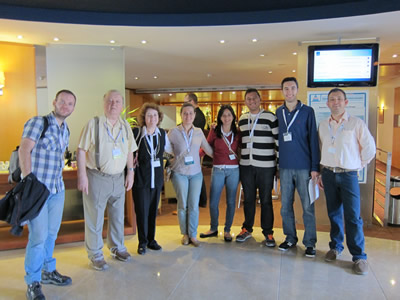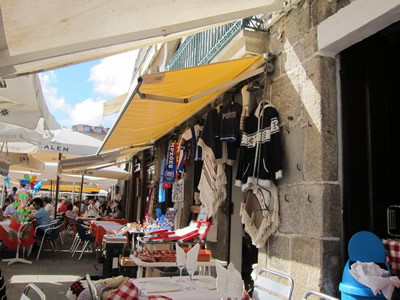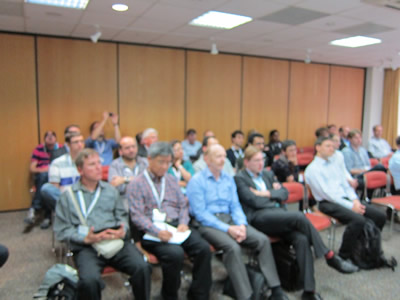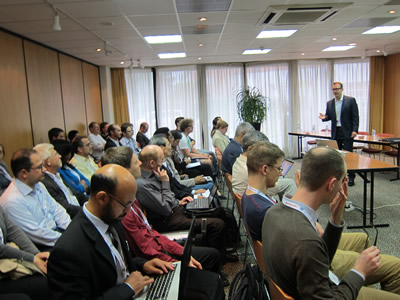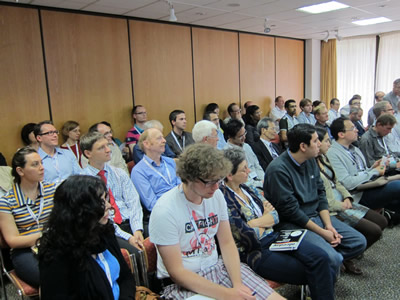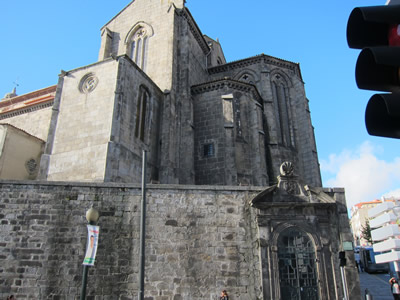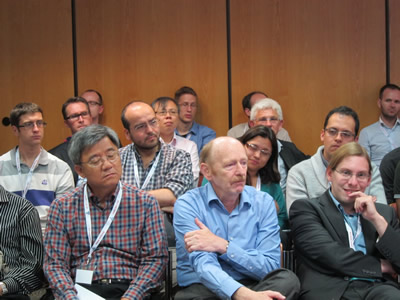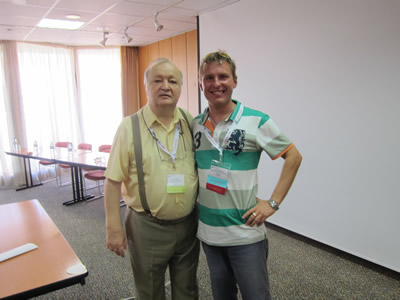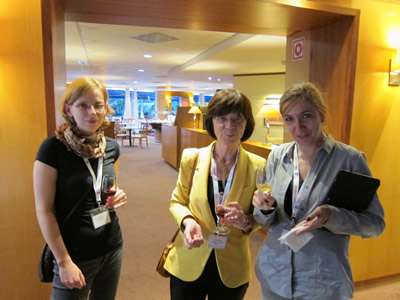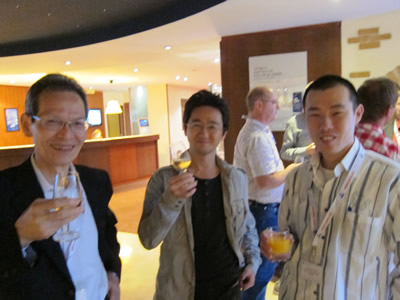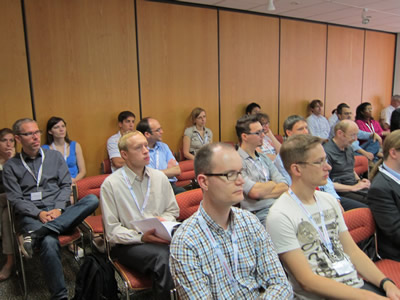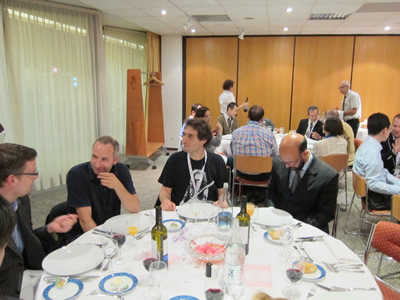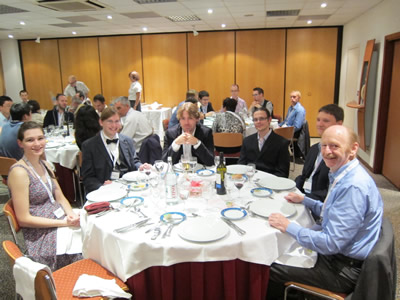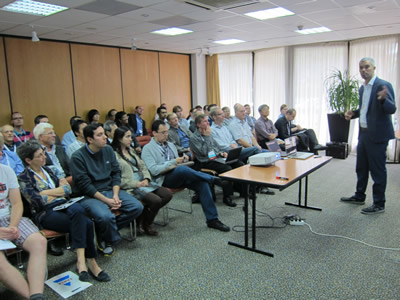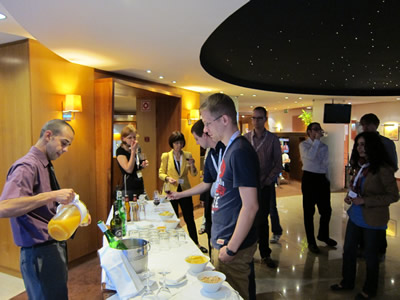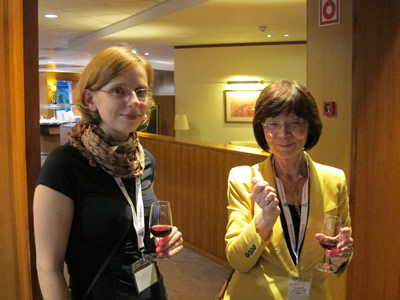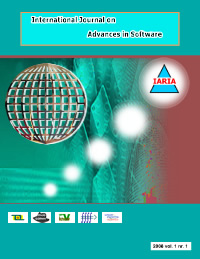ADVCOMP 2019 - The Thirteenth International Conference on Advanced Engineering Computing and Applications in Sciences
September 22, 2019 - September 26, 2019
ADVCOMP 2019: Call for Papers
With the advent of high performance computing environments, virtualization, distributed and parallel computing, as well as the increasing memory, storage and computational power, processing particularly complex scientific applications and voluminous data is more affordable. With the current computing software, hardware and distributed platforms effective use of advanced computing techniques is more achievable.
The goal of the International Conference on Advanced Engineering Computing and Applications in Sciences, ADVCOMP 2019 is to bring together researchers from the academia and practitioners from the industry in order to address fundamentals of advanced scientific computing and specific mechanisms and algorithms for particular sciences. The conference will provide a forum where researchers shall be able to present recent research results and new research problems and directions related to them. The conference seeks contributions presenting novel research in all aspects of new scientific methods for computing and hybrid methods for computing optimization, as well as advanced algorithms and computational procedures, software and hardware solutions dealing with specific domains of science.
We solicit both academic, research, and industrial contributions. We welcome technical papers presenting research and practical results, position papers addressing the pros and cons of specific proposals, such as those being discussed in the standard fora or in industry consortia, survey papers addressing the key problems and solutions on any of the above topics short papers on work in progress, and panel proposals.
Industrial presentations are not subject to the format and content constraints of regular submissions. We expect short and long presentations that express industrial position and status.
Tutorials on specific related topics and panels on challenging areas are encouraged.
The topics suggested by the conference can be discussed in term of concepts, state of the art, research, standards, implementations, running experiments, applications, and industrial case studies. Authors are invited to submit complete unpublished papers, which are not under review in any other conference or journal in the following, but not limited to, topic areas.
All topics and submission formats are open to both research and industry contributions.
ADVCOMP 2019 conference tracks:
Advances on computing theories
Finite-state machines; Petri nets /stochastic/colored/probabilistic/etc; Genetic algorithms; Machine learning theory; Prediction theory; Bayesian theory /statistics/filtering/estimation/reasoning/rating/etc; Markov chains/process/model/etc; Graphs theories
Advances in computation methods
Hybrid computational methods; Advanced numerical algorithms; Differential calculus; Matrix perturbation theory; Rare matrices; Fractals & super-fractal algorithms; Random graph dynamics; Multi-dimensional harmonic estimation
Computational logics
Knowledge-based systems and automated reasoning; Logical issues in knowledge representation /non-monotonic reasoning/belief; Specification and verification of programs and systems; Applications of logic in hardware and VLSI; Natural language, concurrent computation, planning; Deduction and reasoning; Logic of computation; Dempster-Shafer theory; Fuzzy theory/computation/logic/etc
Advances on computing mechanisms
Clustering large and high dimensional data; Data fusion and aggregation; Biological sequence analysis; Biomecatronics mechanisms; Biologically inspired mechanisms; System theory and control mechanisms; Multi-objective evolutionary algorithms; Constraint-based algorithms; Ontology-based reasoning; Topology and structure patterns; Geometrical pattern similarity; Strong and weak symmetry; Distortion in coordination mechanisms
Computing techniques
Distributed computing; Parallel computing; Grid computing; Autonomic computing; Cloud computing; Development of numerical and scientific software-based systems; Pattern-based computing; Finite-element method computation; Elastic models; Optimization techniques; Simulation techniques; Stream-based computing
Resource intensive applications and services (RIAS)
Fundamentals on RIAS; Basic algorithms for RIAS; Communications intensive; Process intensive; Data-intensive computing; Operational intensive; Cloud-computing intensiveness; User intensive; Technology intensive; Control intensive; Complex RIAS; Bioinformatics computation; Large scale ehealth systems; Pharmaceutical/drug computation; Weather forecast computation; Earthquake simulations; Geo-spatial simulations; Spatial programs; Real-time manufacturing systems; Transportation systems; Avionic systems; Economic/financial systems; Electric-power systems
Computational geometry
Theoretical computational geometry; Applied computational geometry; Design and analysis of geometric algorithms; Design and analysis of geometric algorithms and data structures; Discrete and combinatorial geometry and topology; Data structures (Voronoi Diagrams, Delaunay triangulations, etc.); Experimental evaluation of geometric algorithms and heuristics; Numerical performance of geometric algorithms; Geometric computations in parallel and distributed environments; Geometric data structures for mesh generation; Geometric methods in computer graphics; Solid modeling; Space Partitioning; Special applications (animation of geometric algorithms, manufacturing, computer graphics and image processing, computer-aided geometry design, solid geometry)
Interdisciplinary computing
Computational /physics, chemistry, biology/ algorithms; Graph-based modeling and algorithms; Computational methods for /crystal, protein/ structure prediction; Computation for multi-material structure; Modeling and simulation of large deformations and strong shock waves; Computation in solid mechanics; Remote geo-sensing; Interdisciplinary computing in music and arts
Cloud computing
Hardware-as-a-service; Software-as-a-service [SaaS applicaitions]; Platform-as-service; On-demand computing models; Cloud Computing programming and application development; Scalability, discovery of services and data in Cloud computing infrastructures; Privacy, security, ownership and reliability issues; Performance and QoS; Dynamic resource provisioning; Power-efficiency and Cloud computing; Load balancing; Application streaming; Cloud SLAs, business models and pricing policies; Custom platforms; Large-scale compute infrastructures; Managing applications in the clouds; Data centers; Process in the clouds; Content and service distribution in Cloud computing infrastructures; Multiple applications can run on one computer (virtualization a la VMWare); Grid computing (multiple computers can be used to run one application); Cloud-computing vendor governance and regulatory compliance
Grid Networks, Services and Applications
GRID theory, frameworks, methodologies, architecture, ontology; GRID infrastructure and technologies; GRID middleware; GRID protocols and networking; GRID computing, utility computing, autonomic computing, metacomputing; Programmable GRID; Data GRID; Context ontology and management in GRIDs; Distributed decisions in GRID networks; GRID services and applications; Virtualization, modeling, and metadata in GRID; Resource management, scheduling, and scalability in GRID; GRID monitoring, control, and management; Traffic and load balancing in GRID; User profiles and priorities in GRID; Performance and security in GRID systems; Fault tolerance, resilience, survivability, robustness in GRID; QoS/SLA in GRID networks; GRID fora, standards, development, evolution; GRID case studies, validation testbeds, prototypes, and lessons learned
Computing in Virtualization-based environments
Principles of virtualization; Virtualization platforms; Thick and thin clients; Data centers and nano-centers; Open virtualization format; Orchestration of virtualization across data centers; Dynamic federation of compute capacity; Dynamic geo-balancing; Instant workload migration; Virtualization-aware storage; Virtualization-aware networking; Virtualization embedded-software-based smart mobile phones; Trusted platforms and embedded supervisors for security; Virtualization management operations /discovery, configuration, provisioning, performance, etc.; Energy optimization and saving for green datacenters; Virtualization supporting cloud computing; Applications as pre-packaged virtual machines; Licencing and support policies
Development of computing support
Computing platforms; Advanced scientific computing; Support for scientific problem-solving; Support for distributed decisions; Agent-assisted workflow support; Middleware computation support; High performance computing; Problem solving environments; Computational science and education; Neuronal networks
Computing applications in science
Advanced computing in civil engineering; Advanced computing in physics science; Advanced computing in chemistry science; Advanced computing in mathematics; Advanced computing in operation research; Advanced computing in economics; Advanced computing in electronics and electrical science; Advanced computing on Earth science, geosciences and meteorology
Complex computing in application domains
Computation genomic; Management of scientific data and knowledge; Advanced computing in bioinformatics and biophysics; Advanced computing in molecular systems and biological systems; Application of engineering methods to genetics; Medical computation and graphics; Advanced computing in simulation systems; Advanced computing for statistics and optimization; Advanced computing in mechanics and quantum mechanics; Advanced computing for geosciences and meteorology; Maps and geo-images building; Curve and surface reconstruction; Financial computing and forecasting; Advanced computing in robotics and manufacturing; Advanced computing in power systems; Environmental advanced computing
Deadlines:
Submission | Jun 13, 2019 |
Notification | Jul 14, 2019 |
Registration | Jul 27, 2019 |
Camera ready | Aug 07, 2019 |
Deadlines differ for special tracks. Please consult the conference home page for special tracks Call for Papers (if any).
INSTRUCTION FOR THE AUTHORS
Authors of selected papers will be invited to submit extended versions to one of the IARIA Journals.
Publisher: XPS (Xpert Publishing Services)
Archived: ThinkMindTM Digital Library (free access)
Prints available at Curran Associates, Inc.
How to submit to appropriate indexes.
Only .pdf or .doc files will be accepted for paper submission. All received submissions will be acknowledged via an automated system.
Contribution types
- regular papers [in the proceedings, digital library]
- short papers (work in progress) [in the proceedings, digital library]
- ideas: two pages [in the proceedings, digital library]
- extended abstracts: two pages [in the proceedings, digital library]
- posters: two pages [in the proceedings, digital library]
- posters: slide only [slide-deck posted on www.iaria.org]
- presentations: slide only [slide-deck posted on www.iaria.org]
- demos: two pages [posted on www.iaria.org]
FORMATS
Only .pdf or .doc files will be accepted for paper submission. All received submissions will be acknowledged via an automated system.
Final author manuscripts will be 8.5" x 11", not exceeding 6 pages; max 4 extra pages allowed at additional cost.
Helpful information for paper formatting for MS Word can be found here.
There is a community provided LaTeX template: the CTAN package iaria (with full IARIA formatting rules, including IARIA citation style, but for providing citation style it is tightly bound to pdflatex+biblatex+biber). In addition, there is also iaria-lite (not bound to pdflatex+biblatex+biber, but compatible with any TeX stack; thus, it cannot provide the IARIA citation formattings, but only the titlepage and content-related IARIA formatting rules). Based on the iaria package, there is a minimal working example as Overleaf template. When you are using the LaTeX templates, please still adhere to the additional editorial rules.
Slides-based contributions can use the corporate/university format and style.
Your paper should also comply with the additional editorial rules.
Once you receive the notification of contribution acceptance, you will be provided by the publisher an online author kit with all the steps an author needs to follow to submit the final version. The author kits URL will be included in the letter of acceptance.
We would recommend that you should not use too many extra pages, even if you can afford the extra fees. No more than 2 contributions per event are recommended, as each contribution must be separately registered and paid for. At least one author of each accepted paper must register to ensure that the paper will be included in the conference proceedings and in the digital library, or posted on the www.iaria.org (for slide-based contributions).
CONTRIBUTION TYPE
Regular Papers (up to 6-10 page article -6 pages covered the by regular registration; max 4 extra pages allowed at additional cost- ) (oral presentation)
These contributions could be academic or industrial research, survey, white, implementation-oriented, architecture-oriented, white papers, etc. They will be included in the proceedings, posted in the free-access ThinkMind digital library and sent for indexing. Please submit the contributions following the instructions for the regular submissions using the "Submit a Paper" button and selecting the appropriate contribution type. 12-14 presentation slides are suggested.
Short papers (work in progress) (up to 4 pages long) (oral presentation)
Work-in-progress contributions are welcome. These contributions represent partial achievements of longer-term projects. They could be academic or industrial research, survey, white, implementation-oriented, architecture-oriented, white papers, etc. Please submit the contributions following the instructions for the regular submissions using the "Submit a Paper" button and selecting the contribution type as work in progress. Contributors must follow the conference deadlines, describing early research and novel skeleton ideas in the areas of the conference topics. The work will be published in the conference proceedings, posted in the free-access ThinkMind digital library and sent for indexing. For more details, see the Work in Progress explanation page. 12-14 presentation slides are suggested.
Ideas contributions (2 pages long) (oral presentation)
This category is dedicated to new ideas in their very early stage. Idea contributions are expression of yet to be developed approaches, with pros/cons, not yet consolidated. Ideas contributions are intended for a debate and audience feedback. Please submit the contributions following the instructions for the regular submissions using the "Submit a Paper" button and selecting the contribution type as Idea. Contributors must follow the conference deadlines, describing early research and novel skeleton ideas in the areas of the conference topics. The work will be published in the conference proceedings, posted in the free-access ThinkMind digital library and sent for indexing. For more details, see the Ideas explanation page. 12-14 presentation slides are suggested.
Extended abstracts (2 pages long) (oral presentation)
Extended abstracts summarize a long potential publication with noticeable results. It is intended for sharing yet to be written, or further on intended for a journal publication. Please submit the contributions following the instructions for the regular submissions using the "Submit a Paper" button and selecting the contribution type as Extended abstract. Contributors must follow the conference deadlines, describing early research and novel skeleton ideas in the areas of the conference topics. The work will be published in the conference proceedings, posted in the free-access ThinkMind digital library and sent for indexing. 12-14 presentation slides are suggested.
Posters (paper-based, two pages long) (oral presentation)
Posters are intended for ongoing research projects, concrete realizations, or industrial applications/projects presentations. The poster may be presented during sessions reserved for posters, or mixed with presentation of articles of similar topic. A two-page paper summarizes a presentation intended to be a POSTER. This allows an author to summarize a series of results and expose them via a big number of figures, graphics and tables. Please submit the contributions following the instructions for the regular submissions using the "Submit a Paper" button and selecting the contribution type as Poster Two Pages. Contributors must follow the conference deadlines, describing early research and novel skeleton ideas in the areas of the conference topics. The work will be published in the conference proceedings, posted in the free-access ThinkMind digital library and sent for indexing. 8-10 presentation slides are suggested. Also a big Poster is suitable, used for live discussions with the attendees, in addition to the oral presentation.
Posters (slide-based, only) (oral presentation)
Posters are intended for ongoing research projects, concrete realizations, or industrial applications/projects presentations. The poster may be presented during sessions reserved for posters, or mixed with presentation of articles of similar topic. The slides must have comprehensive comments. This type of contribution only requires a 8-10 slide-deck. Please submit the contributions following the instructions for the regular submissions using the "Submit a Paper" button and selecting the contribution type as Poster (slide-only). The slide-deck will be posted, post-event, on www.iaria.org.
8-10 presentation slides are suggested. Also a big Poster is suitable, used for live discussions with the attendees, additionally to the oral presentation.
Presentations (slide-based, only) (oral presentation)
These contributions represent technical marketing/industrial/business/positioning presentations. This type of contribution only requires a 12-14 slide-deck. Please submit the contributions following the submission instructions by using the "Submit a Paper" button and selecting the contribution type as Presentation (slide-only). The slide-deck will be posted, post-event, on www.iaria.org.
12-14 presentation slides are suggested.
Demos (two pages) [posted on www.iaria.org]
Demos represent special contributions where a tool, an implementation of an application, or a freshly implemented system is presented in its alfa/beta version. It might also be intended for thsoe new application to gather the attendee opinion. A two-page summary for a demo is intended to be. It would be scheduled in special time spots, to ensure a maximum attendance from the participants. Please submit the contributions following the submission instructions by using the "Submit a Paper" button and selecting the contribution type as Demos. The Demos paper will be posted, post-event, on www.iaria.org.
Tutorial proposals
Tutorials provide overviews of current high interest topics. Proposals should be for 2-3 hour long. Proposals must contain the title, the summary of the content, and the biography of the presenter(s). The tutorial slide decks will be posted on the IARIA site.
Please send your proposals to tutorial proposal
Panel proposals
The organizers encourage scientists and industry leaders to organize dedicated panels dealing with controversial and challenging topics and paradigms. Panel moderators are asked to identify their guests and manage that their appropriate talk supports timely reach our deadlines. Moderators must specifically submit an official proposal, indicating their background, panelist names, their affiliation, the topic of the panel, as well as short biographies. The panel slide deck will be posted on the IARIA site.
Please send your proposals to panel proposal
